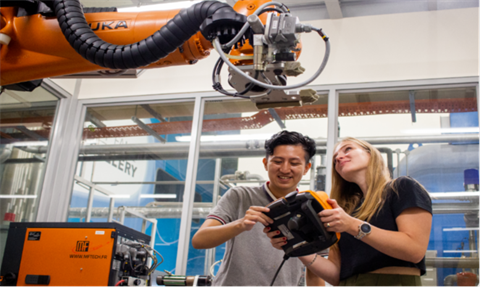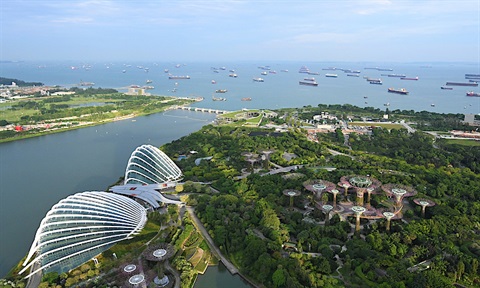Sustainability Education
Education is the key enabler of creating a sustainable world for future generations. At NTU, we seek to incorporate sustainability education for students at different stages of their learning journey, through relevant courses or programmes, to provide them with the foundation and practical tools for understanding the concepts of sustainability and applying them to solve real world problems.
Undergraduate Programmes
Since 2021, we have introduced a sustainability course in our common interdisciplinary core curriculum for all undergraduates. This course aims to develop students with the critical skills to collaborate across disciplines to systematically analyze major sustainability challenges from the perspectives of society, economy, and the environment. Students will learn to address sustainability issues from different viewpoints and at different scales. They will then use these skills to discuss and propose solutions for sustainability challenges facing Singapore and the world.
Bachelor of Science in Biological Sciences with Second Major in Food Science and Technology
This is a prestigious new programme combining the Biological Sciences (Honours) programme with the highly popular Food Sciences and Technology as a 2nd Major, in partnership with the University of Wageningen and School of Chemical and Biomolecular Engineering and School of Physical & Mathematical Sciences in NTU.
Students will be selected from each school to join the FST from the 2nd year of their BEng/BSc programmes. 5 core courses of this major (consisting of both theoretic and practice parts): Food Chemistry, Food Physics, Food Microbiology, Food Process Engineering, and Food Quality Design, will be taught by the faculties from Wageningen University with coordinators at NTU. Students will be able to choose prescribed electives from SCBE, SBS and SPMS. The interdisciplinary nature of the programme will benefit students who are interested in NTU BSc/BEng programmes and at the same time have a strong curiosity about food process with engineering and industrial point of view.
- Online learning via Wageningen University course site with weekly interactive Live Question Hour (LQH)
- Networking for Career Development in Local Food Industry
- Priority Internship in Local Food Industry
- Student Exchange with Wageningen University
- Academic (WU Core Courses)
- Research (Final Year Project)
- Study Trip to Wageningen University
- 1 week of CH9202 Food Physics laboratory class
- 1 week of industrial visits to various food companies and industries in the Netherlands
At least H2 or equivalent pass in Mathematics and a H2 Level or equivalent pass in Physics, Chemistry or Biology
OR
At least H1 or equivalent pass in Mathematics and two H2 Level or equivalent pass in Physics, Chemistry or Biology
This is a full time four-year Bachelor of Science (Honours) in Biological Sciences with 2nd major in Food Science and Technology.
During the period of study for the degree of Bachelor of Science in Biological Sciences with Food Science and Technology Major, a student must pursue such courses of study as may be prescribed by Regulations made by the Academic Board on the recommendation of the School of Biological Sciences.
For successful completion of the programme and be eligible for graduation, students are required to fulfil the following requirements:
- For students admitted to (from AY2021 and onwards), to obtain a total of not less than 137 academic units within the maximum period permitted, unless granted exemption by the School from taking certain courses, on a case-by-case basis.
- For students admitted (from AY2018 to AY2020), to obtain a total of not less than 146 academic units within the maximum period permitted.
- For students admitted in (AY2017 and before), to obtain a total of not less than 147 academic units within the maximum period permitted.
- Students are required to maintain a CGPA of at least 4.0 throughout their course of study. Should a student fail to maintain the required CGPA, the school would recommend him/her the option to drop the 2nd Major and join the standard BS (Hons) programme.
- To qualify for the Food Science and Technology Major, students must complete a minimum of:
- 30AUs of FST courses for AY2021 intake and onwards
- 33AUs of FST courses for AY2020 intake and before
- To have gained a pass grade in all the Major and general education requirement courses as determined by the School of Biological Sciences; and
- Fulfilled other such requirements as may be prescribed by the Academic Board.
The courses fall under the Broadening & Deepening Education (BDE) /General Education Requirement Unrestricted Elective (GER-UE)/ category.
Programme Structure details for matriculation Year 2022 to 2024
Programme Structure details for matriculation Year 2021
Programme Structure details for previous matriculation Years
- For Year 1 students admitted in AY2022 to AY2024
- For Year 1 students admitted in AY2021
- For Year 1 students admitted in AY2020
- For Year 1 students admitted in AY2019
- For Year 1 students admitted in AY2018
- For Year 1 students admitted in AY2015 to AY2017
- For Year 1 students admitted in AY2014
- Science
- Sustainability
- Full-time
- Single Degree with 2nd Major
- AY2022/2023
- College of Science
- School of Biological Sciences
- Bachelor of Engineering in Environmental Engineering
- Bachelor of Engineering in Bioengineering
- Bachelor of Engineering in Chemical and Biomolecular Engineering
- Bachelor of Science in Environmental Earth Systems Science with three specialization options (Geosciences, Ecology, Society)
- Bachelor of Science in Environmental Earth Systems Science and Public Policy and Global Affairs
- Bachelor of Science in Chemistry and Biological Chemistry with Second Major in Environmental Science
- Bachelor of Science in Biological Sciences
- Bachelor of Science in Physics & Energy Studies and Education
- Bachelor of Arts in Geography
- Second Major in Sustainability
- Second Major in Food Science and Technology (Open to Bioengineering, Chemical and Biomolecular Engineering, Chemistry and Biological Chemistry, Biological Sciences)
- Second Major in Society and Urban Systems (Open to Civil Engineering, Electrical & Electronic Engineering, Environmental Engineering, and Mechanical Engineering)
- Minor in Environmental Sustainability
- Minor in Sustainable Urban Planning
- Minor in Environmental Management
- Minor in Environmental Humanities
- Minor in Science, Technology and Society
- Minor in Science of Learning
- Minor in Chemistry and Biological Chemistry
Postgraduate Programmes
NTU is pioneering a new push in PhD education that will tear down barriers and drive research into areas that need a multi-disciplinary approach. In keeping with global trends and needs, students at the Interdisciplinary Graduate Programme at NTU will concentrate on two or more disciplines, instead of one. Today, fresh thinking is urgently needed to mitigate many global challenges, not least in environmental sustainability, the creation of viable alternative energy solutions, and many other wide-ranging and complex issues.
- IGP-APRU-Global Sustainability, Waste & the City
- IGP-Earth Observatory of Singapore (EOS)
- IGP-Singapore Centre for Environmental Life Sciences Engineering (SCELSE)
- IGP-Energy Research Institute @ NTU (ERI@N)
- IGP-Nanyang Environment & Water Research Institute (NEWRI)
- IGP-NTU Institute for Health Technologies (HealthTech NTU)
- GIS and Geospatial Learning in Sustainability
Sustainability has become a key theme in higher education globally. It is also by now a core component of the revised MAHE programme. The spatial thinking tools and applications that you will learn in GIS will help you to better comprehend sustainability issues as well as devise solutions for such problems. This course will enable you to apply GIS vis-a-vis cross-disciplinary perspectives in the Humanities with respect to the Southeast Asian context.
- Global Cities
This course aims to introduce the urban ways of life and appreciate the emergence of global cities beyond the Global North. The course will also include various empirical and grounded experiences of global cities around the world, especially on issues related to urban liveability, sustainability, water, housing and other urban infrastructure issues.
- Environmental Planning and Management
This course examines selected environmental challenges in urban areas and explores planning solutions and management options to avoid or mitigate such problems. Multidisciplinary, integrated solutions that follow principles of sustainability are emphasized.
- Discourses in Sustainability
The environmental and social impacts of global climate change been increasingly emphasised. Accordingly, there is a need to equip learners with the history of sustainability studies, alongside current debates and possible future trajectories of this discipline. This knowledge will help learners better understand situations related to climate change and also opportunities in fostering environmental sustainability.
- Field Inquiry in Sustainability
Fieldwork strengthens our classroom concepts and gives the opportunity to understand the world through inquiry- based learning. This course will equip learners with both the qualitative and quantitative skills to collect and interpret data in ways that can help to inform environmental solutions for a more sustainable future.
- Second Major in Sustainability
- Aspiring students with a passion for Sport Science & Management (SSM) now can complement their degree by undertaking a Second Major in Sustainability. This Second Major in Sustainability within the SSM degree programme equips students with the knowledge and skills to address pressing environmental and social challenges faced by the sports industry.
- MBA (Sustainability & Innovation) Track
- Master by Research in Earth and Environmental Science
- Doctor of Philosophy in Earth and Environmental Science
- Joint NTU-TUM Master of Science in Green Electronics
- Master of Engineering (Research) in Civil and Environmental Engineering
- Doctor of Philosophy in Civil and Environmental Engineering
- Doctor of Philosophy in Biological Sciences
- Master of Science in Civil Engineering
- Master of Science in Maritime Studies
- Master of Science in Smart Manufacturing
- Master of Science in Power Engineering
- Master of Science in Materials Science and Engineering
- MBA (Strategy & Innovation)
- Master of Science in Finance
Continuing Education
NTU Continuing Education offers a wide range of programmes and courses for working professionals that are curated from various disciplines and conducted via different learning platforms. Aligning with the Government’s concerted effort to build sustainability as a way of work, play and life, that is the Green economy, specialised topics such as Sustainability Design, Energy Management, Environmental Management and etc. are created and delivered as either short courses or semester long courses, credit-bearing and stackable towards the relevant certificate(s) such as Specialist, Graduate and/or FlexiMasters certificate.














/enri-thumbnails/careeropportunities1f0caf1c-a12d-479c-be7c-3c04e085c617.tmb-mega-menu.jpg?Culture=en&sfvrsn=d7261e3b_1)

/cradle-thumbnails/research-capabilities1516d0ba63aa44f0b4ee77a8c05263b2.tmb-mega-menu.jpg?Culture=en&sfvrsn=1bc94f8_1)

7e6fdc03-9018-4d08-9a98-8a21acbc37ba.tmb-mega-menu.jpg?Culture=en&sfvrsn=7deaf618_1)



.tmb-listing.png?Culture=en&sfvrsn=1cb78cbd_1)
67c7970f-c11d-4403-b8eb-7d52eb23d471.tmb-listing.jpg?Culture=en&sfvrsn=e00131a8_1)






